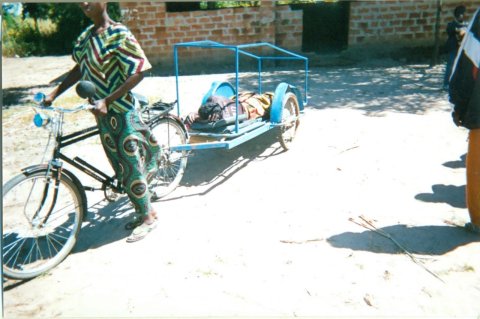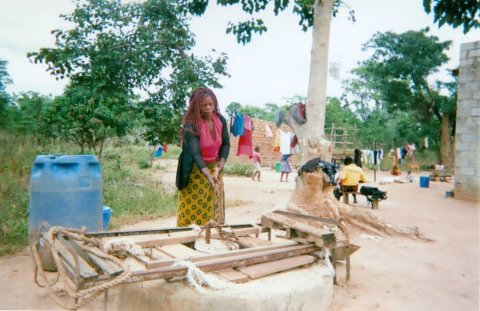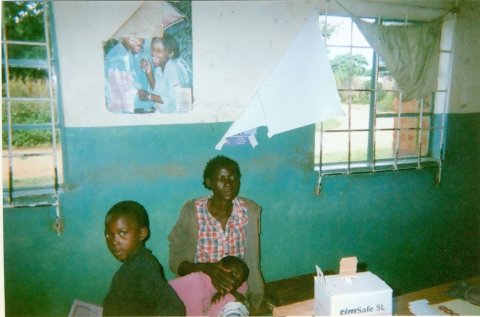Photo Voice: community health in focus

Written by Aimee Edmondo, MPH; Bevis Phiri, Msc International Public Health; Z’Kera Sims, MPH on behalf of Global Health Corps Zambia
“Photo Voice helped us highlight the challenges that community health workers face in Zambia, where they are not recognised formally by the government, and yet they do so much for society,” Bevis Phiri.
At the 5th Global Symposium on Health Systems Research in Liverpool this October, Bevis accepted the Photo Voice first-place award, on behalf of Global Health Corps Zambia fellows, from the Royal Society of Tropical Medicine and Hygiene.
A community of young global health leaders
Wind, shoot, wind, shoot, wind, shoot. After our first Photo Voice workshop in April 2017, community health workers (CHWs) from Chongwe District took turns practising taking pictures with us – a mix of Zambians and Americans completing a year-long fellowship with Global Health Corps (GHC).
GHC is a US-based international leadership development organisation comprised of a diverse cadre of young professionals from across the globe working toward health equity.
As part of the fellowship, GHC requires fellows to collectively identify a pressing issue within their placement country. Fellows then work together to plan and implement a community engagement project to address this issue.
In Zambia, where there are 0.09 physicians per 1,000 people, CHWs fill an important gap, providing basic diagnostic, referral, and primary care services in hard to reach or underserved communities. Through their efforts on the ground in urban and rural settings, CHWs transform access to healthcare in Zambia and are instrumental in lowering the burden of many diseases.
Yet, CHWs are not formally recognised by the government, which means they receive minimal training and often are not compensated for the work they do. As fellows working in Zambia’s health sector, we regularly encountered CHWs providing care in their communities or local health facilities.
We knew and understood the important role CHWs served in strengthening primary care in under resourced settings. Our personal and professional experiences were the catalyst for our decision to empower CHWs to advocate for themselves through photography and storytelling using the Photo Voice method.
Eyes wide open

Our fellowship cohort worked closely with Zambia’s Ministry of Health and Chongwe District health authorities to identify a group of 15 CHWs to participate in our Photo Voice project. The CHWs attended three workshops where they were taught basic photography and storytelling techniques.
- Workshop 1: Fellows taught CHWs photography composition, the importance of consent, and provided them disposable cameras to take back to their communities with specific instructions—capture both the challenges and the rewards of serving as a CHW.
- Workshop 2: Fellows spoke with CHWs about storytelling and primed them to think of some of the stories they might tell from the photos they captured.
- Workshop 3: CHWs reviewed their developed photos, selecting those they felt best represented their experiences. For each picture selected, we assisted them in writing accompanying captions to illustrate the story told through the photo.
To encourage ownership of the Photo Voice project, fellows offered to let the CHWs propose a name for the activity. Aptly, the CHWs settled on Masompenya which translates to “focus” or “eyes wide open” in the language of the Soli tribe located in Central Province.
In May 2017, fellows and CHWs came together to hold a Photo Voice exhibition in Lusaka attended by stakeholders from governmental and non-governmental organisations who often work closely with CHWs.
The exhibition provided CHWs a platform to tell their own stories through photos, to bring awareness to the health challenges faced in their communities, and to illustrate resource constraints faced by CHWS.
A change in perspective
In international health and development, photography has long been used as a misguided tool that often results in “othering”. Rarely do the subjects of development have an opportunity to tell their own stories.
In Zambia, as in many African countries with oral traditions, storytelling is an integral practice. It is how culture is shared, preserved, and celebrated. Photo Voice is a unique tool that embraces these traditions and has the potential to offer insight on health and development issues from the perspective of those who have the most important story to tell.
For GHC Zambia fellows, photographic storytelling proved to be a powerful awareness and advocacy tool to highlight the importance of CHWs in the Zambian health system.
An opportunity for continued advocacy

Through Masompenya, GHC fellows in Zambia sought to empower an important cadre of health care providers to share their experiences through photography and storytelling. While Masompenya was a small-scale effort, it was widely received positively by CHWs, the Zambian Government, and stakeholders.
However, we recognised that CHW stories could be amplified through additional outlets so that others could learn from their photos and, as a result, might better implement programmes that are inclusive of CHWs and CHW perspectives.
Through the GHC community, we learned about a Photo Voice exhibition at the 2018 Global Symposium on Health Systems Research. We applied to the exhibition, recognising this was a unique opportunity to elevate the importance of CHWs in resource constrained health systems.
Winning this competition is a testament to the power and persuasiveness of the visuals and stories captured by Chongwe District CHWs. We are honoured to be the conduit in which we can share their experiences with the world.
Our next chapter
The 2016 -2017 GHC Zambia fellowship concluded in July of 2017. We all started new journeys, some fellows entered graduate programmes or returned to school, others started new careers, or returned to previous ones.
What has remained is our commitment to attaining global health equity. Being selected as the Photo Voice competition winners is a reminder that we are on the right track.
The Chongwe District CHWs continue to provide health services in their communities. While their stories are documented, we are always looking for more ways to share them with a wider audience.
Bevis: “While it always feels good to be honoured in such a special way, this award was particularly special because it recognised our efforts as fellows in supporting marginalised populations and the commitment Community Health Workers (CHW) have in their communities in delivering healthcare despite doing it on a voluntary basis.
“Thank you to Jane Ardrey and Helen Carlin (Liverpool School of Tropical Medicine) for coordinating the Photo Voice activities, as well as Elaine McNeill and Elizabeth McNulty (Liverpool John Moores University) for curating the exhibition.”